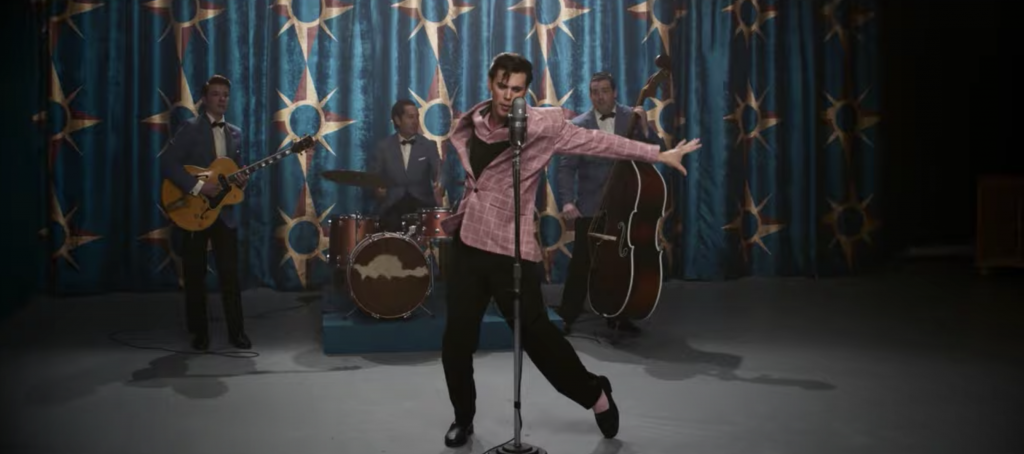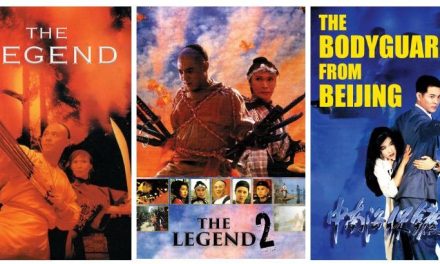Ladies and gentlemen, Elvis has entered the building.
Baz Luhrmann’s Presley biopic Elvis hits theaters this week, and it’s full of all the hip-shaking, pelvic-thrusting, rock-n-roll crooning you can handle.
Elvis is going to be a divisive film. Luhrmann’s extremely stylized, maximalist visuals are pretty love-them-or-hate-them, for one. Tom Hank’s role will also split audiences. Most importantly, while Elvis keeps things fun and entertaining, it doesn’t necessarily deliver the biopic experience. (Personally, I expected more, but I’ll get to that in a minute.)
Austin Butler Is Perfect As Elvis Presley
First things first, despite the film’s flaws, it has to be said that Austin Butler is perfect as Elvis Presley. Thank you, casting department!
Seriously, his performance as The King is by far the highlight of the film. Butler has the voice and the mannerisms down. Give him a swoopy pompadour, some eye makeup, and a jumpsuit, and he’s ready to rock and roll with the best of them.

Butler apparently sings all of Presley’s early music in Elvis; for the later part of his career, the movie uses a combination of Presley’s actual performances blended together with Butler’s. And honestly, most of the time I really couldn’t tell who was singing! Huge kudos to Butler for his ability to chameleon his voice and talent in this way. All things considered, Butler easily draws you into this movie, the same way Elvis himself could draw a crowd. Somebody nominate this man for an award, stat!
Tom Hanks Is… Bizarre As Colonel Tom Parker
And on the other hand… we have Elvis’ other lead, Tom Hanks.
It pains me to ever critique a national treasure like Tom Hanks. You know him. You love him. That he’s a talented actor goes without saying.
You will probably want to forget you ever saw him in this movie.
Elvis is (loosely) told from the perspective of Presley’s long-time manager, Colonel Tom Parker (played by Hanks). If there’s a villain in this story, it’s the Colonel. The film takes care to show how the Colonel sees Presley first and foremost as a cash cow, and the way he guided (manipulated?) the singer over the years to his own ends. Ultimately, this leads to some pretty heavy stuff – the Colonel leaving Presley in millions of dollars of debt, all while getting him hooked on a cocktail of drugs to keep him performing on a grueling schedule.

Unfortunately, it’s really hard to take this as seriously as we should, because it’s hard to take the Colonel seriously. Hanks delivers a performance best described as “nefarious villain in a Saturday morning cartoon,” complete with a truly bizarre and distracting accent. (Often, the script doesn’t do him any favors. Just wait until he starts yelling about Santa Claus.)
The vibe could most charitably be described as “campy.” The character – because at no point does the Colonel ever feel like a real person – definitely has Baz Luhrmann energy. But where a wacky villain can be fun in the right story (the Duke in Luhrmann’s Moulin Rouge! comes to mind), a wacky villain in a real-life story like Elvis feels distractingly out of place.
Elvis: On the outside looking in
But besides the performances by Butler and Hanks, is Elvis a good movie?
I guess that depends on what you’re hoping to get out of it. It’s certainly a visual spectacle. I felt entertained from start to finish. However, it doesn’t do much to succeed as a biopic about Elvis Presley.
What’s in a biopic?
For me, a good biopic includes two elements: an informative timeline and personal insight into the subject. I want to journey through someone’s life and learn about events I previously hadn’t been aware of, and I want to see the subjects’s thoughts and feelings about these events play out on screen. In other words, when I watch a biopic, I want to learn something new and find a deeper emotional connection to the film’s subject.
Elvis doesn’t deliver strongly on either of those fronts.

Despite the fact that the film takes us through essentially the entire life of Elvis Presley, I didn’t feel like I learned much about the man himself or his career. Is my base knowledge of Elvis just higher than the average person’s? Maybe. (My little sister did have an Elvis obsession for a while when we were growing up, so maybe I absorbed more secondhand Elvis Facts than I realized.) But I definitely feel like I’ve watched biopics an hour shorter that provided me with five times the insight into their subject. It was disappointing to walk out of the theater feeling like I hadn’t learned anything significant about someone who clearly had such a complex and interesting experience with fame.
Furthermore, the narrative framing of the film from the Colonel’s perspective often keeps us at a distance from Elvis himself. There are a few strong standout scenes – when Elvis grieves the death of his mother, and when he prepares for his comeback concert – that offer a bit of the personal insight I was looking for. But for most of the movie, we’re still just outsiders looking in. We don’t get to see nearly enough of what Presley thought and felt during all of the changes in his life.
Treading lightly through history
There also seems to be a certain hesitance (unwillingness? un-surety?) in how to ground Elvis’ story in a historical and social context. Namely, the movie never seems to find its footing with the issue of race and Presley’s fame; while it’s willing to acknowledge that Elvis was allowed to rise to widespread fame in the music industry because he was white, it does a lot of tiptoeing around the issue of Presley’s musical roots coming from the talent and stylings of Black musicians.

The movie knows it can’t completely ignore Elvis’ Beale Street influences, but it also can’t take a stand that might offend his fans. The result is a film that feels like it doesn’t know what it wants to say about Presley – like his story has been sanitized for general consumption. (A similar argument about glossing over some of the more unsavory parts of Presley’s life could be made about how the movie treats Priscilla.)
This lack of perspective, combined with the distancing effect of its narrative framing, makes it feel like Elvis never quite hits the way you want it to. I wanted an intimate look inside the life and times of a music legend. But ultimately, we’re all still just on the outside looking in.
The Baz Luhrmann Of It All
Essentially, Elvis feels less like a true biopic and more like a Baz Luhrmann-ified tribute to his life. From the swirling camera motions, to the in-your-face maximalist visuals, to the jukebox of rotating Presley hits, Elvis is a spectacle. It’s a show. It’s flashy and fun and entertaining.
But it’s also shallow.
While the Luhrmann aesthetic seems perfectly matched to the splendor and showmanship of Elvis and his bejeweled jumpsuits, its frenetic energy and inherent campiness keep the movie from landing on a deeper emotional level. Despite setting us up for an intimate look at Presley’s life, you’d learn more about him from a quick skim of his Wikipedia page.
Wikipedia doesn’t have Austin Butler putting on a show in lace button-ups though.
So maybe we just need to appreciate Elvis for what it is: another chance to experience The King in all his glory. The legend lives on, even if we’ll have to look elsewhere if we want something with more substance than spectacle.

Elvis premieres in theaters June 24.

![Elvis: A Visual Spectacle Too Shallow To Be Called ‘The King’ Of Biopics [Review]](https://www.thathashtagshow.com/wp-content/uploads/2022/06/project_20220621_1525228-01-1200x640.png)

![Totally Killer – Slash To The Future [Fright-A-Thon Review]](https://www.thathashtagshow.com/wp-content/uploads/2023/09/382639915_335007235612486_2397412716149017136_n-440x264.jpg)


